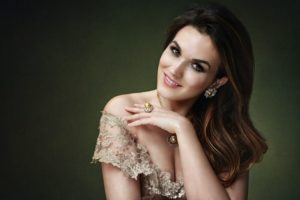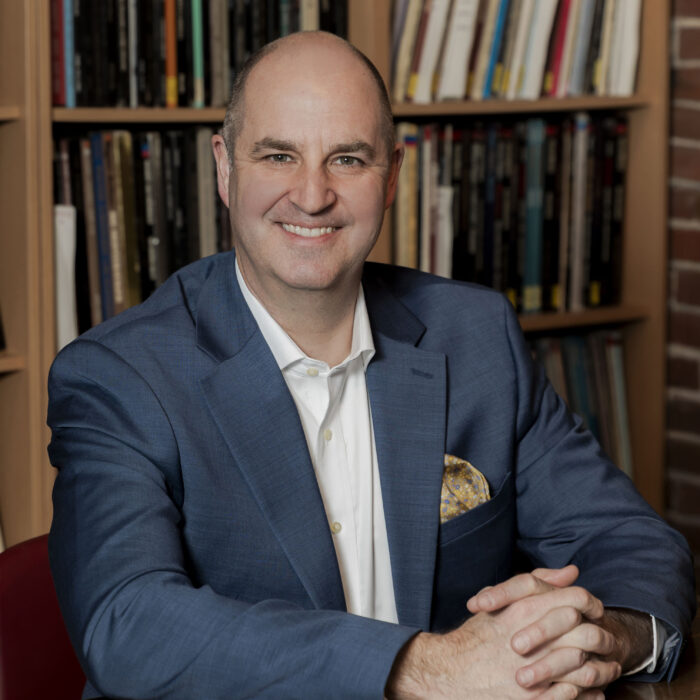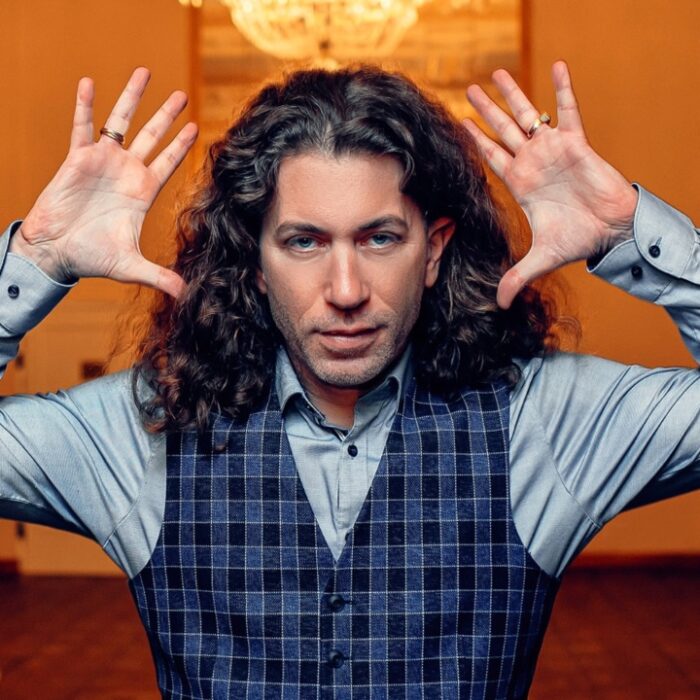
Discovering Cultures – Olga Peretyatko Sings Her First French Role, Explores Russia & Returns To Bel Canto
By Francisco SalazarOpera requires a singer to perform in numerous languages. This can be daunting for anyone who does not speak any given tongue or does not have a connection to the corresponding culture.
While some singers overcome this challenge by learning as much as is needed for a given piece, others feel that total immersion is the key to success.
Case in point, Russian soprano Olga Peretyatko.
Having grown up speaking Russian and German, she quickly took up Italian as she dove deep into the Bel Canto repertoire. But there was something missing in her repertoire, French roles.
Over the past years, Peretyatko has performed arias from many French operas including “Manon,” “Les Contes d’Hoffmann” and “La Fille du Régiment.” However, she has never actually sung a role in the language.
That will change this month as she takes on the role of Leila in Bizet’s “Les Pecheur de Perles,” marking her first foray into French music.
“It’s a new language for me and I’m quite good at it because I can speak it now. That is why I accepted the role because all the roles I do I believe you should speak the language that you sing in,” she told OperaWire in a recent interview.
Leila
Taking on this increasingly popular opera has been a blessing for the Russian diva, who has found the French language captivating. Moreover, knowing the language has enhanced the musical experience because she has been able to focus on the musical line and work with her colleagues.
“The arias are amazing and there is a range of color. Bizet did such a beautiful job. And we have extremely beautiful duets with the tenor and baritone and it is such a joy to sing.”
Working on the piece she has discovered that Bizet’s writing is very much in the style of some of the composers she is very familiar with but she also noted that the French language had one other challenge.
“It’s different vowels in French,” Peretyatko revealed. “It’s much more important to pronounce. There are many more leaps. I have gotten more confident and am enjoying the role. As long as I know the language the challenges get easier. For me, the most difficult thing is the text and the pronunciation and always after every rehearsal, I make sure to see what should be done and corrected. It’s very nice time to work. After Leila, I will sing Les Contes d’Hoffmann and it’s very good preparation so I am very much looking forward.”
“For me, the most difficult thing is the text and the pronunciation and always after every rehearsal, I make sure to see what should be done and corrected. It’s very nice time to work. After Leila, I will sing ‘Les Contes d’Hoffmann’ and it’s very good preparation so I am very much looking forward.”
The process has also made her aware that the libretto is not always the best. But as the soprano notes she has always been able to find something in each piece she does and this work is no exception.
“I love the duet with the tenor because of the melody but the dramatic high point is the duet between soprano and baritone. And it’s so dramatic and it’s extremely long, like 40 pages of the score,” she noted. “It has a lot of moods and this explosion of Leila. It’s demanding but I love it so much. There are a lot of colors and you have this conflict between your duty and your love. And the surprise that Zurga loves you too and to be there between two men, it just needs to be dramatic.”
Wim Wenders and the Libretto
The opportunity of debuting Leila at the Berlin Staatsoper has also given Peretyatko the possibility of working with a cinematic legend, Wim Wenders. It marks the operatic debut of the director and Peretyatko is extremely thrilled to be working with him.
“Wim Wenders is such a nice person. We have worked together to create the role and it has been a great learning experience,” she said.
Peretyatko noted that Wenders does not read music but that has not prevented him from seeking out help or making the experience less rigorous. It has actually made the collaboration stronger as Wenders has been detailed with the libretto. But what has made the experience all the more wondrous for the Russian soprano is the style of the production itself.
“It’s absolutely normal, not avant-garde and we do what’s actually written in the score,” she enthused. “So If I have to go to the left, I have to go to the left. And somehow it’s strange for me now because, after all these crazy productions that I did, this is so normal and beautiful.”
What she has also enjoyed about the process is seeing how Wenders’ adopted his cinematic approach to the opera world.
“Cinema and opera are quite different. Here it should be like Hitchcock where you have no cuts and we explained that to Wim Wenders. You don’t have another chance to shape it because you start there and finish there. You have one chance and he understood that and it was quite something new. It’s beautiful to have the chance to see him work in a new art form. He loves French and he loves this music and he is absolutely in it. And of course, [maestro Daniel] Barenboim helps a lot because has so much experience.”
Russian Light
While Peretyatko has been preparing her first French work, she has also been promoting her new CD, “Russian Light.” It marks her fourth CD for Sony Classical but it is a step away from her German and Italian repertoire.
But the step was an essential one.
“It was just a question of time and of course there was a concept,” she revealed.
Even though she is Russian, the album’s repertoire is not one she has really delved in or work that she is sought after for. Out of all the arias in the album, she has only performed one.
“I only sang Marfa in ‘The Tsars Bride’ and that’s it. I just wanted to show to the world how beautiful this music is and took some of my favorites. Nobody knows it but ‘The Tsar’s Bride’ is very popular in Russia.”
However, that did not take away from her personal connection to the music. When Peretyatko chose the music for the album, she made sure to pick music that was important to her but also music that people could discover and connect with on an emotional level. For example, the Shostakovich selections were incredibly important.
“He wrote a lot of cinema music but nobody knows of it. It’s forgotten. And this is light Shostakovich and he has melodies everywhere. This was new music for me and when we decided to do something special for this CD, I immediately thought of doing this kind of Shostakovich.”
And then there were more obvious composers.
“Glinka, which I call the Russian Rossini, which is the same style and it’s completely Bel Canto and I took it and played with it. Then there is a block of Rimsky-Korsakov songs and arias and the Sadko Lullaby is one of my favorite pieces in Russian literature. And ‘The Golden Cockerel,’ this is a beautiful aria. And Rimsky-Korsakov is such an important person in the musical history of Russia because he was a professor in the Conservatoire and a bunch of Russian composers studied under him.”
The other aspect that was crucial for Peretyatko was the orchestra. It was crucial that the soprano work with a Russian conductor and ensemble because it would make the process much easier for the CD. The result was the Ural Philharmonic and the Dmitry Liss.
“I know them very well and we worked a lot together. We tried to have a Russian orchestra and conductor because with a European orchestra you will lose time to explain the character of the music. And the preparation will be more effective and that is why I wanted a Russian orchestra. They have the sound for the Russian music in their DNA.”
With this new CD, one wonders whether or not the soprano will add more Russian works to her repertoire. Peretyatko was not closed off to the idea and she revealed, “We have plans but unfortunately, I can’t say more.”
Lucia di Lammermoor
This winter Peretyatko returns to the Metropolitan Opera for “Lucia di Lammermoor,” a role she has performed three times and one she has scored great acclaim for. But it is also a role that she feels she has had to restart.
“I did it in 2011, 2012 and recently in Tokyo in 2016. It was like a new debut because after five years your body and your voice change. So I restarted once more and it’s very different. It’s always a bit new and you should really do it like it’s the first time.”
One reason for relearning the role is Peretyatko’s ever-growing voice.
“It’s become bigger and bigger. I have a very important middle register now. Singers all change the repertoire or redo their technique. To stay in this kind of repertoire is very healthy. My machine is getting bigger and it’s very good for Lucia.”
The soprano is recognized for her ease and flexibility with coloratura and she is also known for her high notes. However, Peretyatko is very adamant about what a Lucia should sound like.
“It was not written with all this stuff. It’s optional. In the score there is no E flat or great fioritura. It’s written for a big voice because the Donizetti orchestra is very strong and you should have a very strong voice. And we are used to seeing a lot of high sopranos with great tops but nothing in the middle. And it’s alway the question of what is your preference. But the most important thing the emotion and that will create a very strong Lucia. The musical language will help.”
One of the most dramatic moments in the opera is the second act duet with Lucia’s brother Enrico and the mad scene. Both scenes are central to the opera and for Peretyatko these are the best moments of the work.
“I love the duet with the baritone. It’s very much like the duet with Leila and Zurga. It’s very important dramaturgical point and, of course, I love the mad scene. It’s so wonderfully written you can create different colors. It’s a hypnotizing moment and I love it so much.”
As for the production by Mary Zimmerman, which has been criticized for numerous years, Peretyatko has nothing but glowing accolades to throw its way.
“I love it very much and I love this vision that appears. I have heard a lot of negative critics but I did not find it boring. It is gorgeous. and we shall see.”


